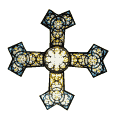FROM GOLDEN LEGEND
http://employees.oneonta.edu/farberas/arth/Arth213/Arena_Joachim.html
Story of Joachim and Anna, the parents of the Virgin Mary (top register south wall)
|
East
|
|
|
|
|
West
|
|
Expulsion of Joachim from the Temple
|
Joachim's Return to the Sheepfold
|
Annunciation to Anna
|
Joachim's Sacrifice
|
Vision of Joachim
|
Joachim and Anna at the Golden Gate
|
|
Expulsion of Joachim from the Temple
|
Golden
Legend: Sept 8: Nativity of the Virgin Mary: [Saint Jerome] relates
therefore that Joachim, who was of Galilee and of the town of Nazareth, took
to wife Saint Anna of Bethlehem. Both were just, and walked without reproach
in all the commandments of the Lord. They divided all their substance in
three parts, allotting one part to the Temple and its ministers, and another
to the poor and the pilgrims, reserving the third part to themselves and the
uses of their household. Thus they lived for twenty years, and had no issue
of their wedlock; and they made a vow to the lord that if He granted them
offspring, they would dedicate it to the service of God. For this they went
to Jerusalem to celebrate the three principal feasts of each year. And once,
when Joachim and his kinsmen went up to Jerusalem at the feast of the
Dedication, he approached the altar with them, in order to offer his
sacrifice. A priest saw him, and angrily drove him away, upbraiding him for
daring to draw near the altar of God, and calling it unseemly that one who
lay under the curse of the Law should offer sacrifice to the Lord of the Law,
or that a childless man, who gave no increase to the people of God, should stand
among men who bore sons. At this Joachim was covered with confusion, and was
ashamed to return to his home., lest he have to bear the contempt of his
kindred, who had heard all....
|
|
Joachim's Return to the Sheepfold
|
The
Golden Legend: (Sept 8: Nativity of the Virgin Mary): He went off
therefore and dwelt for some time among his shepherds.
Protoevangelion, I,5-6: ...he was exceedingly
distressed, and would not be seen by his wife: But retired into the
wilderness, and fixed his tent there and fasted forty days and forty nights.
|
|
Annunciation to Anna
|
The
Golden Legend: (Sept 8: Nativity of the Virgin Mary): Meanwhile Anna
wept bitterly, not knowing where her husband had gone. Then the same angel
appeared to her, and revealed to her the same things which he had announced
to Joachim, adding that as a sign she was to go to the Golden Gate of
Jerusalem, to meet her husband at his return.
|
|
Sacrifice of Joachim
|
|
|
|
The
Golden Legend : (Sept 8: Nativity of the Virgin Mary: But one day
when he was alone, an angel appeared to him, surrounded by dazzling light. He
was affrighted at the vision, but the angel bade him be without fear, saying:
"I, the Lord's angel, am sent to thee, to announce to thee that they
prayers are granted, and thine almsworks have ascended in the sight of the
Lord. I have seen thy shame, and heard the reproach of barrenness wrongfully
cast upon thee. For God indeed punishes not nature, but sin; and therefore,
when He closes a womb, it is only that He may later open it more wondrously,
and that all may know that what is born thereof is the fruit of lust but of
the divine munificence. Did not Sara, the first mother of your race, bear the
shame of barrenness until her ninetieth year, and yet bear Isaac, to whom was
promised the blessing of all nations? Did not Rachel also long remain barren,
and yet beget Joseph, who was the ruler of all of Egypt? Who was stronger
than Samson or holier than Samuel? Yet both of these were the sons of barren
mothers! Therefore believe my words and these examples: those conceived after
long delay, and begotten of sterile mothers, are wont to be admirable! Thus
Anna thy wife will bear thee a daughter, and thou shalt call her name Mary.
In accordance with your vow, she shall be consecrated to the Lord from her
infancy, and shall be filled with the Holy Spirit from her mother's womb; nor
shall she abide without, among the common folk, but within the Temple of the
Lord, lest aught of evil be thought of her. And as she wilkl be born of a
barren mother, so will she herself, in wondrous wise, beget the Son of the
Most High. Whose name will be called Jesus, and through Whom salvation will
come to all nations! And this will be a sign to thee: when thou shalt come to
the Gold Gate of Jerusalem, Anna thy wife will meet thee there, who now
grieves at thy tarrying, and then will rejoice to see thee!" And with
these words the angel left him.
|
|
Joachim and Anna at the Golden Gate
|
The
Golden Legend (Sept 8, Nativity of the Virgin Mary): Thus it was,
following the angel's command, they came face to face [ at the Golden Gate],
and shared their joy over the vision which they had both seen, and over the
certainty that they were to have offspring. Then they adored God and set out
for their home, awaiting the Lord's promise in gladness of heart.
|
https://en.wikipedia.org/wiki/Joachim_and_Anne_Meeting_at_the_Golden_Gate
Giotto_-_Scrovegni_-_-06-_-_Meeting_at_the_Golden_Gate
Giotto di Bondone, Legend of St Joachim Meeting at the Golden Gate 1305 is an
early depiction of the scene.
Durer,_vita_della_vergine
Albrecht Dürer Joachim and Anne Meeting at the Golden Gate 1504
+++++++++++++++++++++++++++
























